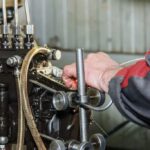When you’re in the process of buying a home, it can be easy to get swept up in the excitement of finding your dream property. But amid the thrill of touring homes and envisioning your future, it’s important not to overlook one critical step: a professional home inspection. Whether you’re a first-time homebuyer or a seasoned pro, scheduling a home inspection is essential before finalizing any purchase. A home inspection gives you an in-depth understanding of the property’s condition, which could save you from making a costly mistake.
In this blog post, we’ll explore why professional home inspection services are crucial, what they include, and how you can find the right home inspector to work with.
What is a home inspection?
A home inspection is a detailed examination of a property’s condition, carried out by a certified home inspector. During the inspection, the home inspector will assess both the visible and hidden aspects of the property, looking for signs of damage, wear, or any safety hazards. The goal is to help you, the buyer, understand the true condition of the home before you sign the final papers.
The home inspection process is typically non-invasive and non-destructive, meaning that the inspector won’t make any changes to the property or tear things apart. Instead, they will use specialized tools and knowledge to thoroughly examine the property, identifying any potential issues that could affect its value or your safety.
Why Should You Hire a Professional Home Inspector?
Many buyers feel tempted to skip a professional home inspection, either because they think they can identify any issues on their own or because they want to save money. However, a home inspection is an investment that can save you significant expenses in the long run. Here’s why it’s essential to hire a professional:
- Identify Hidden Problems
Even the most well-maintained homes can have hidden issues that are not visible during a typical walkthrough. Professional home inspectors are trained to spot problems that you may not even notice, such as faulty wiring, plumbing issues, or structural damage. These issues can lead to costly repairs down the road, so it’s important to identify them before you make a purchase. - Ensure Your Safety
Some home problems, like mold or radon, can pose serious health risks. A certified home inspector will not only identify such issues but also provide you with advice on how to remedy them. This could prevent potential health hazards that might be overlooked during a casual viewing. - Prevent Expensive Future Repairs
Home inspections can reveal issues that may not be immediately obvious. such as cracks in the foundation, roofing problems, or faulty electrical systems. By discovering these problems early. You can either negotiate with the seller to have them repaired or lower your offer accordingly. it may even allow you to walk away from a deal that would have cost you much more than you anticipated. - Understand Long-Term Costs
A home inspector provides valuable insights into the condition of a property’s major systems, like HVAC, plumbing, and electrical. They can help you understand the age and efficiency of these systems, allowing you to better plan for future maintenance or replacement costs. - Peace of Mind
Perhaps the most significant benefit of a home inspection is peace of mind. With a professional’s thorough report, you’ll know exactly what you’re getting into, whether the house is in top condition or requires some work. This can help you make a well-informed decision, avoiding surprises that could arise after you move in.
What Does a Professional Home Inspector Look For?
During a home inspection, the inspector will carefully evaluate various components of the home. Here are some of the areas that will be thoroughly assessed:
- Roof and Gutters: Inspectors check for signs of wear, damage, or leaks on the roof. They also examine gutters and downspouts to ensure they are functioning properly.
- Foundation and Structure: Inspecting the foundation and overall structure of the home is critical. Any cracks, settling, or moisture issues could indicate serious problems.
- Plumbing: Home inspectors will check for leaks in pipes, ensure that water pressure is adequate, and inspect the condition of the water heater.
- Electrical Systems: A home inspector will look for outdated or faulty wiring, as well as safety concerns like exposed wires or improperly grounded outlets.
- HVAC Systems: The inspector will evaluate the heating and cooling systems, making sure they are working properly, and look for signs of wear or damage.
- Windows and Doors: Properly functioning windows and doors are essential for energy efficiency and security. Inspectors will check for drafts, broken seals, or damage.
- Basement and Attic: These spaces are often overlooked. But the inspector will examine the condition of the basement or attic for signs of moisture, pests, or mold.
How to Choose the Best Home Inspector Near Me
Now that you understand the importance of a home inspection, it’s time to find the right inspector for your needs. Choosing the best home inspector near you can make all the difference in ensuring a thorough and accurate assessment. Here are some tips for finding a reliable professional:
- Check Qualifications
Always ensure the inspector is licensed, certified, and insured. Look for inspectors who are members of recognized organizations like the American Society of Home Inspectors (ASHI), as these professionals must adhere to strict standards. - Experience Matters
Experience matters when it comes to home inspections. Choose an inspector with a proven track record in the industry. An experienced inspector will know what to look for and can provide you with an accurate and comprehensive report. - Read Reviews
Online reviews from previous clients can provide valuable insight into an inspector’s reliability and quality of service. Be sure to read multiple reviews on different platforms to get an accurate picture. - Ask for References
Don’t hesitate to ask the inspector for references from past clients. Speaking directly to previous clients can give you a better idea of what to expect. - Request a Sample Report
Ask the home inspector for a sample report to ensure that the information provided will be clear, detailed, and useful.
What Happens After the Home Inspection?
After the inspection is completed, the home inspector will provide you with a detailed report outlining their findings. This report will highlight any issues discovered, along with photos and descriptions. You’ll also receive recommendations for any repairs or follow-up actions needed.
Once you receive the report, you can use it to negotiate with the seller for repairs or price reductions. You can decide if you’re still comfortable moving forward with the purchase.
Conclusion
A professional home inspection is one of the smartest decisions you can make before buying a home. It provides an opportunity to uncover hidden problems, prevent costly repairs, and ensure that the property is safe and sound. By hiring a trusted home inspector, you’re investing in peace of mind and protecting your long-term financial security.
Don’t skip this vital step in the home-buying process. Schedule a professional home inspection before making any final decisions about your new home!



